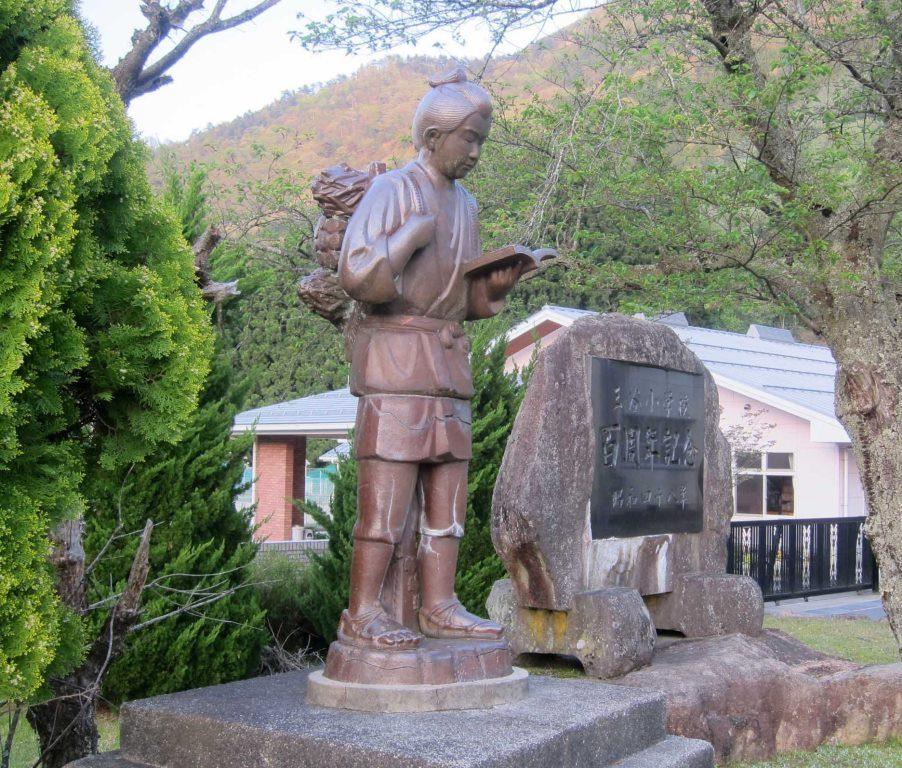二宮金次郎さん(大人になってからの名前は二宮尊徳さん)は、人々が豊かに暮らすための大切な考え方として、主に4つの教えを説きました。これらは「報徳の教え」とも呼ばれ、現代の私たちにとっても大切なことです。
- 「積小為大(せきしょういだい)」:小さなことを積み重ねて大きなことを成し遂げる これは、「小さいことを毎日コツコツと続けることで、いつか大きな成果になるよ」という教えです。例えば、毎日少しずつ貯金をすると、いつか大きなお金になるよね。毎日ちょっとずつ勉強をすれば、難しい問題も解けるようになる。金次郎さんは、薪を背負いながら本を読んだり、少しずつでも貯蓄をしたりして、この教えを実践しました。
- 「推譲(すいじょう)」:分かち合い、譲り合う気持ちを大切にする これは、「自分だけの利益を考えるのではなく、周りの人や社会のために、持っているものや得たものを分かち合いましょう」という教えです。例えば、自分が得たお金や知識を、困っている人に分け与えたり、みんなのために使ったりすることです。みんなで助け合えば、全体がもっと良くなる、という考え方です。
- 「勤労(きんろう)」:まじめに働くことの大切さ これは、「一生懸命、まじめに働くことが大切だよ」という教えです。ただ働くのではなく、知恵を使い、工夫をしながら効率よく働くことも含まれます。金次郎さん自身も、子ども時代からとてもまじめに働き、村を豊かにするために一生懸命働きました。
- 「分度(ぶんど)」:自分の身の丈に合った暮らしをする これは、「自分の収入や能力に合わせて、無駄遣いをせず、計画的にお金を使うことが大切だよ」という教えです。背伸びをしたり、見栄を張ったりして、収入以上の生活をしてはいけないという意味です。例えば、お小遣いの範囲で欲しいものを買う計画を立てるようなものです。この教えを守ることで、無駄が減り、貯蓄もできるようになります。
これらの教えは、金次郎さんが実際に自分の人生で実践し、そして多くの村を立て直す中で広めていった大切な考え方です。今でも、私たちの生活や社会を豊かにするためのヒントがたくさん詰まっていますね。




Ninomiya Sontoku's Four Teachings: The "Hotoku no Oshie"
Ninomiya Kinjiro, later known as Ninomiya Sontoku, was a prominent figure who advocated four fundamental principles for people to live prosperously. These teachings, known as the "Hotoku no Oshie," remain highly relevant for us today.
1. Sekisho Idai (積小為大): Accumulating Small Efforts for Great Achievements
This teaching emphasizes that consistently building up small efforts leads to significant accomplishments. It's like saving a small amount of money daily, which eventually grows into a large sum, or studying a little bit each day to eventually solve complex problems. Kinjiro himself exemplified this by reading books while carrying firewood and diligently saving, no matter how small the amount.
2. Suijo (推譲): Emphasizing Sharing and Concession
This principle highlights the importance of sharing what you have and what you gain with others and society, rather than solely focusing on personal gain. It means sharing your money or knowledge with those in need or using it for the common good. The idea is that mutual aid and cooperation will ultimately benefit everyone.
3. Kinro (勤労): The Importance of Diligent Work
This teaching stresses the value of working hard and diligently. It's not just about laboring, but also about working efficiently by using wisdom and ingenuity. Kinjiro himself was a diligent worker from childhood and worked tirelessly to revitalize villages.
4. Bundo (分度): Living Within One's Means
This principle advises living within one's income and capabilities, avoiding waste, and managing money systematically. It warns against living beyond your means or spending lavishly to impress others. For example, it's like planning to buy what you want within the limits of your allowance. By adhering to this teaching, waste is reduced, and savings can accumulate.
These teachings were not just theories; Kinjiro actively practiced them throughout his life and disseminated them while successfully rebuilding numerous villages. Even today, they offer abundant wisdom for enriching our lives and society.